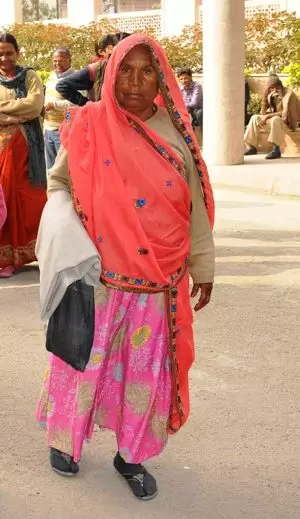Is formal education a must for a grassroots leader?
15-June-2015
Vol 6 | Issue 24
Way back in 1981, when Norati Devi had joined the Social Work and Research Centre (SWRC), a non government organisation that works out of Tilonia village in Rajasthan’s Ajmer district, she wanted to do something for her people and, in the process, make something of her life.
She got her opportunity when SWRC’s director Sanjit Roy filed a petition in the court that year on behalf of Norati and other women against the gross violations of the Minimum Wages Act, 1948, by the state Public Works Department during the construction of a road connecting the village.
 |
|
The ordinance passed by government of Rajasthan changing the basic educational qualifications has not only relegated dedicated sarpanches like Norati Devi to the sidelines, but has also led many candidates to produce fake mark sheets (Photo: Rakesh Kumar\ WFS)
|
With guidance from Roy, the fiery village woman successfully mobilised 300 women labourers, who had been paid lesser wages than the men working on site.
The fight went right up to the Supreme Court, which gave a landmark ruling in January 1983 in favour of the women. Not only did the Court direct that the women get paid as per the minimum wages of that time – Rs 7 a day – but that officials guilty of differential treatment be put behind bars.
That case made Norati a household name in the region and in the years that followed she emerged as a prominent rights activist.
From participating in the Right To Information (RTI) movement led by Aruna Roy and others, to leading the protest in the Bhanwari Devi gang rape and Divrala sati cases, she was always ready to stand up for justice. Over the years, Norati even got several opportunities to step outside her village, her state and the country, travelling to China, Germany and the US to share her experiences.
With an impressive track record to her credit, it came as no surprise when, in 2010, Norati was elected the Sarpanch (village head) of Harmara village.
And as expected she conscientiously did the duties assigned to her – be it implementing welfare schemes, especially ensuring equitable access to work and wages for women under the National Rural Employment Guarantee Act (NREGA), or holding gram sabhas on time.
Yet, this year, when Norati wanted to contest for the Zila Parishad (district governing body), her candidature was rejected. The state government ordinance, which has laid minimum educational qualifications for contesting different positions in the Panchayat, changed everything.
In spite of being proficient in tackling local issues and being e-literate – she has undergone a six-month training at SWRC and taught more than 8,000 rural women to use the computer – her lack of formal education has rendered her ineligible to be a people’s representative.
An ordinance seeking to amend the Rajasthan Panchayati Raj Act, 1994, has made Class Eight (Class Five for tribal candidates) the minimum educational qualification for the post of sarpanch, while for a place on the Panchayat Samiti and Zila Parishad, prospective members should have cleared Class 10.
Ever since this controversial directive was issued in December 2014, it has created quite a stir – good and bad. And though the panchayat elections did take place as per schedule earlier this year, the experience v/s education debate continues to draw a range of opinions and arguments.
As a long time observer of the Panchayati Raj process in Rajasthan and director of the Neemrana-based Social Action for Human Resource Development (SOHARD), a voluntary organisation that works with women PRI representatives, Niranjan Sharma’s experience tells him that whereas education can be an undeniable advantage it cannot be the defining criterion for picking out a person best suited for governance at the grassroots.
“The debate between formal education and practical experience is a perennial one. Although there’s no refuting the fact that education is important and will surely enable the PRI members to do their duties efficiently there are people like Norati Devi who have shown that a school certificate isn’t all that matters when it comes to providing good governance.
“The ordinance has been issued on the presumption that educated representatives will implement government schemes better and won’t be exploited by government officials such as the panchayat secretary or the block development officer (BDO). But this theory is yet to be tested,” he says.
For now, this directive has certainly changed the educational profile of the panchayat representative in the state. A look at the comparative data from the last two elections – in 2010 and 2015 – clearly reflects this.
Forty-eight per cent of village heads elected in 2015 have completed their Class Eight. This is up from 22 per cent in 2010. On the Panchayat Samiti and Zila Parishad, too, there’s been a significant jump in the number of literate elected members.
From just 18 per cent in 2010, 54 per cent Panchayat Samiti members now have their Class Ten certificate, whilst 70 per cent of those in the Zila Panchayat boast of the same qualification, up from 33 per cent.
Another noteworthy development is the presence of young people, such as Annu Sharma, 23, and Vasundhra Choudhary, 21, in the governing bodies.
In 2010, only 333 out of 9,166 sarpanches were under 25; today, 2,960 sarpanches are in this age group. Presently, Sharma, a civil services aspirant, is the Pradhan of Bhinay Panchayat Samiti in Ajmer district, while Choudhary, the suave psychology student from Delhi University, is the uncontested Sarpanch of Lilawali in Hanumangarh district.
Sharma truly believes that representatives who have done their higher education are able to quickly learn the ropes of government functioning, which can otherwise take years. “I have seen how BDOs have undermined Pradhans by taking crucial decisions without consulting them. With me, that will not be possible,” she says.
“An educated person is astute enough to identify crucial issues that can have far-reaching consequences for people,” adds Amatulla Mehar, 21, Pradhan of Sankara Panchayat Samiti (PS) in Jaisalmer district.
In 2008, when she had passed her Class 10, she had been the only girl from her village, Chacha, to have achieved the impossible. These days, Mehar, who has courageously stood against child marriage and motivated families to enrol girls into school, is busy making budget plans for the panchayat samiti as she awaits her first year results of Masters in English Literature.
But despite the positive outcomes, there’s no overlooking the problems that have emerged in light of the ordinance. Not only have dedicated sarpanches like Norati Devi been relegated to the sidelines, but it has led many candidates to produce fake mark sheets.
According to the state Panchayati Raj Department, till May 5, 2015, 479 elected sarpanches have been booked for producing fake documents to contest polls. In all, the department has received complaints against 777 PRI representatives.
“This was bound to happen,” remarks Norati, who has challenged the ordinance in the Rajasthan High Court, “We tried to pre-empt this when we approached Supreme Court and later Rajasthan High Court [after the Apex Court asked us to approach HC] against the ordinance. The reality is that the education levels in rural areas are extremely low, especially among women. Obviously, people will resort to using false documents.”
Kavita Srivastav, Secretary of Public Union for Civil Liberties (PUCL), also points out, “When there’s no educational criterion for MPs and MLAs, why should there be one for PRIs? Imposing the Class Eight schooling stipulation for the sarpanch has led to the disqualification of a majority of the population.”
Nikhil Dey of the Mazdoor Kisan Shakti Sangathan (MKSS) backs up Srivastava’s claim with data, “The ordinance restrained about 3,800 PS members (out of about 5,000) and more than 550 Zila Parishad members (out of 1000) from contesting due to the education criteria.”
Norati, who has spent a better part of her life serving people, concludes, “The lack of formal education was never a handicap when I was addressing an international audience or when I did my duties as a sarpanch. After all, good intent is what matters more than anything else.” - Women's Feature Service














